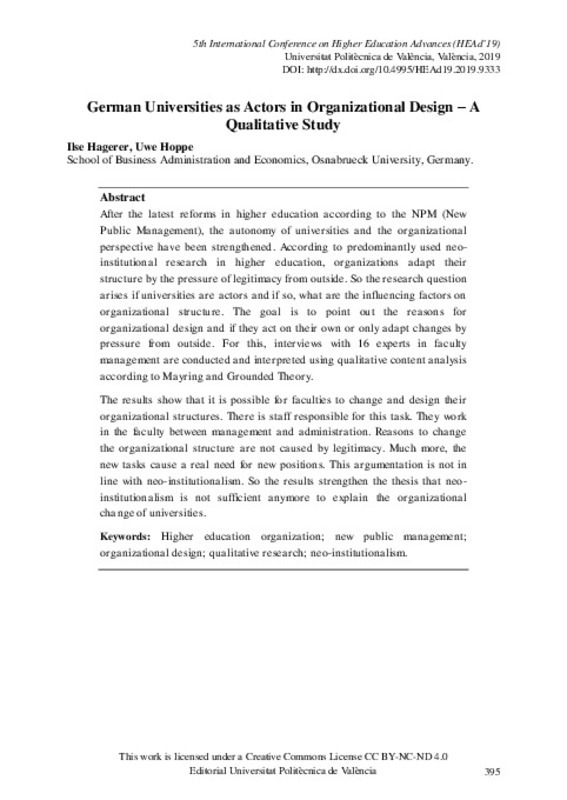JavaScript is disabled for your browser. Some features of this site may not work without it.
Buscar en RiuNet
Listar
Mi cuenta
Estadísticas
Ayuda RiuNet
Admin. UPV
German Universities as Actors in Organizational Design – A Qualitative Study
Mostrar el registro sencillo del ítem
Ficheros en el ítem
| dc.contributor.author | Hagerer, Ilse
|
es_ES |
| dc.contributor.author | Hoppe, Uwe
|
es_ES |
| dc.date.accessioned | 2019-07-29T06:46:55Z | |
| dc.date.available | 2019-07-29T06:46:55Z | |
| dc.date.issued | 2019-07-05 | |
| dc.identifier.isbn | 9788490486610 | |
| dc.identifier.issn | 2603-5871 | |
| dc.identifier.uri | http://hdl.handle.net/10251/124338 | |
| dc.description.abstract | [EN] After the latest reforms in higher education according to the NPM (New Public Management), the autonomy of universities and the organizational perspective have been strengthened. According to predominantly used neo-institutional research in higher education, organizations adapt their structure by the pressure of legitimacy from outside. So the research question arises, if universities are actors and if so, what are the influencing factors on organizational structure. The goal is to point out the reasons for organizational design and if they act on their own or only adapt changes by pressure from outside. For this, interviews with 16 experts in faculty management are conducted and interpreted using qualitative content analysis according to Mayring and Grounded Theory. The results show that it is possible for faculties to change and design their organizational structures. There is staff responsible for this task. They work in the faculty between management and administration. Reasons to change the organizational structure are not caused by legitimacy. Much more, the new tasks cause a real need for new positions. This argumentation is not in line with neo-institutionalism. So the results strengthen the thesis that neo-institutionalism is not sufficient anymore to explain the organizational change of universities. | es_ES |
| dc.format.extent | 10 | es_ES |
| dc.language | Inglés | es_ES |
| dc.publisher | Editorial Universitat Politècnica de València | es_ES |
| dc.relation.ispartof | HEAD'19. 5th International Conference on Higher Education Advances | es_ES |
| dc.rights | Reconocimiento - No comercial - Sin obra derivada (by-nc-nd) | es_ES |
| dc.subject | Higher Education | es_ES |
| dc.subject | Learning | es_ES |
| dc.subject | Educational systems | es_ES |
| dc.subject | Teaching | es_ES |
| dc.subject | Higher Education Organization | es_ES |
| dc.subject | New Public Management | es_ES |
| dc.subject | Organizational design | es_ES |
| dc.subject | Qualitative research | es_ES |
| dc.subject | Neo-institutionalism | es_ES |
| dc.title | German Universities as Actors in Organizational Design – A Qualitative Study | es_ES |
| dc.type | Capítulo de libro | es_ES |
| dc.type | Comunicación en congreso | es_ES |
| dc.identifier.doi | 10.4995/HEAD19.2019.9333 | |
| dc.rights.accessRights | Abierto | es_ES |
| dc.description.bibliographicCitation | Hagerer, I.; Hoppe, U. (2019). German Universities as Actors in Organizational Design – A Qualitative Study. En HEAD'19. 5th International Conference on Higher Education Advances. Editorial Universitat Politècnica de València. 395-404. https://doi.org/10.4995/HEAD19.2019.9333 | es_ES |
| dc.description.accrualMethod | OCS | es_ES |
| dc.relation.conferencename | Fifth International Conference on Higher Education Advances | es_ES |
| dc.relation.conferencedate | Junio 26-28, 2019 | es_ES |
| dc.relation.conferenceplace | València, Spain | es_ES |
| dc.relation.publisherversion | http://ocs.editorial.upv.es/index.php/HEAD/HEAD19/paper/view/9333 | es_ES |
| dc.description.upvformatpinicio | 395 | es_ES |
| dc.description.upvformatpfin | 404 | es_ES |
| dc.type.version | info:eu-repo/semantics/publishedVersion | es_ES |
| dc.relation.pasarela | OCS\9333 | es_ES |








